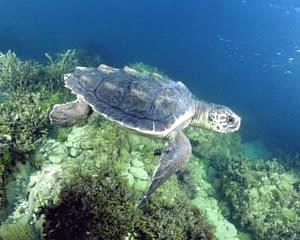
Loggerhead sea turtle.
NOAA's Fisheries Service today announced an emergency rule to protect threatened sea turtles in the Gulf of Mexico.
The temporary rule, which takes effect May 18, will require the commercial reef fish longline fleet to fish seaward of a line approximating the 50-fathom contour in the Gulf of Mexico. Current regulations require this fleet to fish seaward of 20-fathoms.
The Gulf of Mexico Fishery Management Council requested this emergency rule after a NOAA observer study documented the reef fish longline fleet was incidentally catching and killing too many loggerhead sea turtles.
This emergency rule will primarily affect longline fishermen who target shallow-water grouper species, such as red grouper. Most shallow-water grouper fishing occurs within the 50-fathom contour off the west Florida shelf – an important sea turtle feeding area – where most of the incidental sea turtle bycatches occur. The emergency rule also prohibits all reef fish longline fishing east of 85 degrees 30 minutes west longitude in the Gulf of Mexico after the quotas for deep water grouper and tilefish are reached.
"We are working closely with the council and constituents to find more permanent solutions to protect sea turtles affected by this fishing gear," said Roy Crabtree, NOAA's Fisheries Service southeast regional administrator. "I hope we can identify options that not only provide sea turtles the protection they need, but minimize the economic affects to the fishing industry."
Loggerhead sea turtles are listed as "threatened" under the Endangered Species Act. NOAA's Fisheries Service is implementing the emergency rule in accordance with both the Endangered Species Act and the Magnuson-Stevens Act.
The Magnuson-Stevens Act requires that conservation and management measures minimize bycatch of non-target species and minimize mortality when bycatch cannot be avoided.
The emergency rule will be in effect for 180 days and can be extended for up to an additional 186 days. The Gulf of Mexico Fishery Management Council is considering actions to address this issue on a long-term basis.
NOAA understands and predicts changes in the Earth's environment, from the depths of the ocean to the surface of the sun, and conserves and manages our coastal and marine resources.
